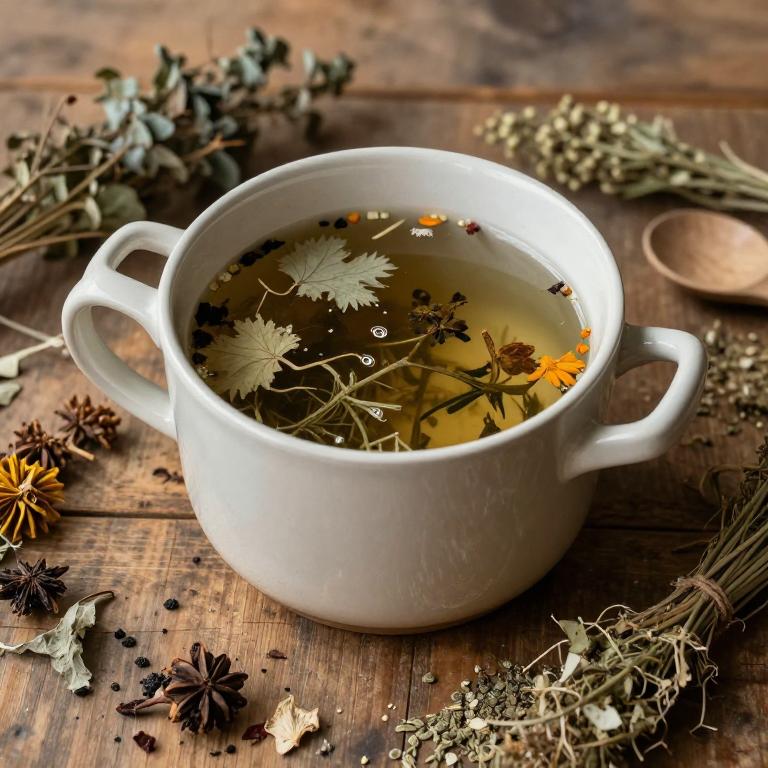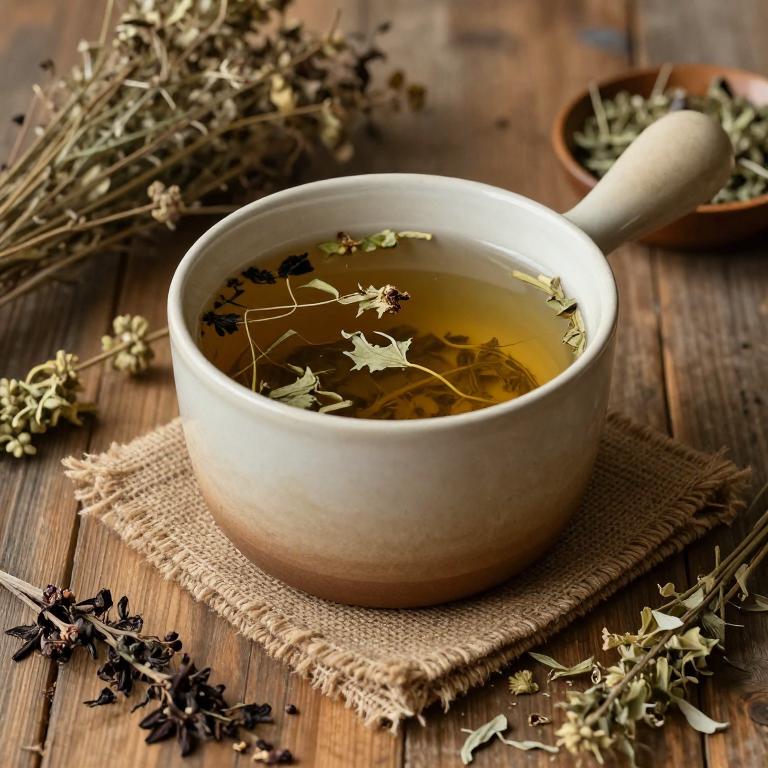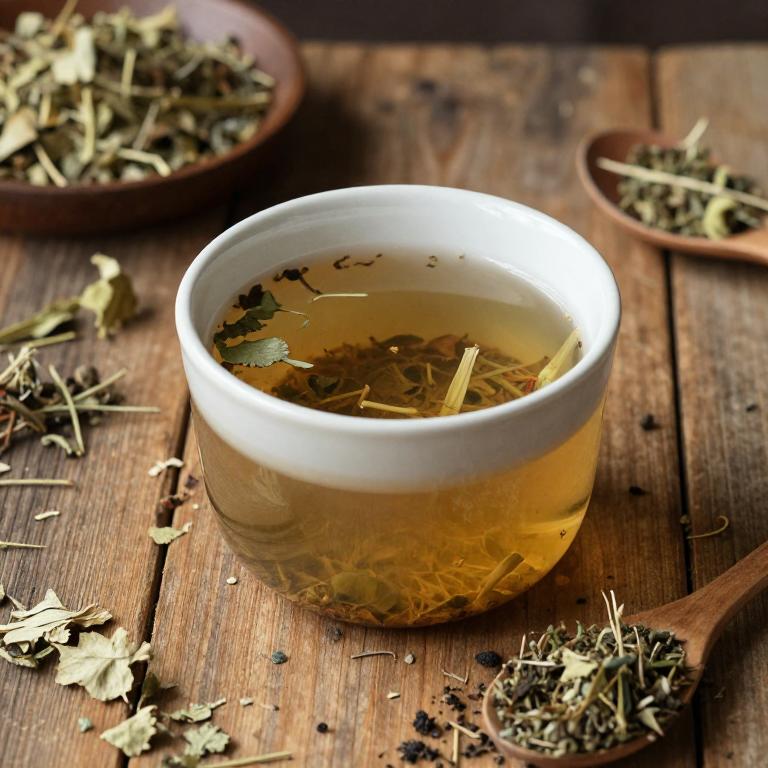10 Best Herbal Decoctions For Aging

Herbal decoctions have been traditionally used for centuries to support the health of aging individuals, offering a natural approach to managing age-related conditions.
These preparations typically involve simmering dried herbs in water to extract their active compounds, which can have anti-inflammatory, antioxidant, and immune-boosting properties. Common herbs like ginseng, ashwagandha, and turmeric are often included for their potential to enhance vitality and cognitive function in older adults. While herbal decoctions may provide complementary benefits, they should be used under the guidance of a healthcare professional to ensure safety and efficacy.
As research continues, these ancient remedies are gaining renewed interest for their role in promoting holistic well-being during the aging process.
Table of Contents
- 1. Panax ginseng (Panax ginseng)
- 2. Chaste tree (Vitex agnus-castus)
- 3. Ginkgo (Ginkgo biloba)
- 4. Turmeric (Curcuma longa)
- 5. Thistle (Silybum marianum)
- 6. St. john's wort (Hypericum perforatum)
- 7. Ashwagandha (Withania somnifera)
- 8. Salvia (Salvia officinalis)
- 9. Echinacea (Echinacea purpurea)
- 10. Yarrow (Achillea millefolium)
1. Panax ginseng (Panax ginseng)

Panax ginseng, a widely used adaptogenic herb, has been traditionally valued for its potential benefits in promoting vitality and longevity, particularly in aging populations.
Herbal decoctions made from Panax ginseng roots are prepared by simmering the dried root in water, allowing the active compounds such as ginsenosides to be extracted for medicinal use. These decoctions are believed to support cognitive function, enhance energy levels, and reduce the effects of stress, which are commonly associated with the aging process. In traditional Chinese medicine, Panax ginseng decoctions are often prescribed to improve immune function and overall well-being in older adults.
However, their efficacy and safety should be evaluated through scientific research to ensure proper use and potential benefits for aging individuals.
2. Chaste tree (Vitex agnus-castus)

Vitex agnus-castus, commonly known as chasteberry, has been traditionally used in herbal medicine for its potential benefits in supporting hormonal balance, particularly in women.
Herbal decoctions of Vitex agnus-castus are often prepared by simmering the dried fruit in water, allowing the active compounds to be extracted for consumption. These decoctions are believed to influence the hypothalamic-pituitary-ovarian axis, which may help regulate menstrual cycles and alleviate symptoms of premenstrual syndrome. As people age, hormonal fluctuations can lead to various health concerns, and Vitex agnus-castus may offer a natural approach to managing these changes.
However, it is important to consult with a healthcare provider before using herbal decoctions, especially for individuals with existing medical conditions or those taking other medications.
3. Ginkgo (Ginkgo biloba)

Ginkgo biloba herbal decoctions have been traditionally used to support cognitive function and overall vitality in aging individuals.
These decoctions are prepared by simmering the leaves of the ginkgo tree in water, extracting bioactive compounds such as flavonoids and terpenoids. Research suggests that these compounds may enhance blood circulation, reduce oxidative stress, and improve memory and mental clarity in older adults. As a complementary therapy, ginkgo biloba decoctions are often recommended for their potential to alleviate age-related cognitive decline.
However, it is important to consult a healthcare professional before use, as it may interact with certain medications or have side effects in some individuals.
4. Turmeric (Curcuma longa)

Curcuma longa, commonly known as turmeric, has been widely studied for its potential benefits in supporting healthy aging through its active compound, curcumin.
Herbal decoctions made from Curcuma longa are traditionally prepared by simmering the rhizome in water, allowing the extraction of bioactive compounds such as curcuminoids and volatile oils. These decoctions are believed to possess anti-inflammatory, antioxidant, and neuroprotective properties that may help reduce age-related oxidative stress and inflammation. In traditional medicine systems like Ayurveda and Chinese medicine, turmeric decoctions have been used for centuries to promote longevity and support joint health, cognitive function, and skin vitality.
While more research is needed to fully understand its mechanisms, emerging scientific evidence suggests that regular consumption of Curcuma longa decoctions may contribute to holistic approaches in managing the aging process.
5. Thistle (Silybum marianum)

Silybum marianum, commonly known as milk thistle, is a herbal remedy that has gained attention for its potential benefits in supporting aging bodies.
Its active compound, silymarin, is believed to have antioxidant, anti-inflammatory, and liver-protecting properties, which may help combat the cellular damage associated with aging. Herbal decoctions made from Silybum marianum are often used to support liver function, which is crucial for detoxification and overall metabolic health as one ages. Some studies suggest that silymarin may also help in reducing oxidative stress and promoting skin health, contributing to a more youthful appearance.
However, while preliminary research is promising, more clinical trials are needed to fully understand its efficacy and safety for aging populations.
6. St. john's wort (Hypericum perforatum)

Hypericum perforatum, commonly known as St. John's wort, has been traditionally used in herbal medicine for its potential benefits in supporting aging-related health concerns.
Herbal decoctions of Hypericum perforatum are prepared by simmering the dried plant material in water, allowing the active compounds such as hypericin and hyperforin to be extracted. These decoctions are often used to support mood regulation and cognitive function, which are commonly affected as people age. The anti-inflammatory and antioxidant properties of Hypericum perforatum may help reduce oxidative stress and inflammation associated with aging.
However, it is important to consult a healthcare professional before using this herb, as it can interact with certain medications and may have side effects.
7. Ashwagandha (Withania somnifera)

Withania somnifera, commonly known as ashwagandha, is an adaptogenic herb widely used in Ayurvedic medicine for its potential benefits in managing the effects of aging.
Herbal decoctions made from the roots of Withania somnifera are traditionally prepared by boiling the dried root in water, allowing the active compounds to be extracted for consumption. These decoctions are believed to support overall health by reducing stress, enhancing cognitive function, and improving sleep quality, all of which are important factors in aging. Research suggests that compounds like withanolides may have antioxidant and anti-inflammatory properties that contribute to cellular health and longevity.
As interest in natural remedies grows, Withania somnifera herbal decoctions are increasingly being explored as complementary approaches to support healthy aging.
8. Salvia (Salvia officinalis)

Salvia officinalis, commonly known as sage, has been traditionally used in herbal medicine for its potential benefits in supporting aging populations.
Herbal decoctions made from sage leaves are believed to enhance cognitive function and may help alleviate symptoms of memory decline, making them a popular remedy for age-related cognitive impairment. These decoctions are often prepared by simmering dried sage leaves in water, allowing the active compounds such as rosmarinic acid and flavonoids to be extracted. Research suggests that sage may have antioxidant and anti-inflammatory properties that contribute to its protective effects on brain health.
As a result, salvia officinalis herbal decoctions are increasingly being explored as a natural complement to conventional approaches in promoting healthy aging.
9. Echinacea (Echinacea purpurea)

Echinacea purpurea, commonly known as purple coneflower, is a popular herbal remedy often used for its potential immune-boosting properties.
Herbal decoctions of Echinacea purpurea are traditionally prepared by simmering the dried roots, leaves, and flowers in water to extract their active compounds. These decoctions are believed to support immune function and may help reduce the duration and severity of colds and other respiratory infections. As people age, their immune systems naturally weaken, making them more susceptible to illnesses, and some studies suggest that Echinacea may offer mild benefits in this regard.
However, it is important to consult with a healthcare provider before using Echinacea, especially for elderly individuals, as it may interact with certain medications or conditions.
10. Yarrow (Achillea millefolium)

Achillea millefolium, commonly known as yarrow, has been traditionally used in herbal medicine for its potential benefits in supporting the health of aging individuals.
Herbal decoctions of yarrow are prepared by simmering the dried aerial parts of the plant in water, allowing the active compounds to be extracted for medicinal use. These decoctions may help alleviate symptoms associated with aging, such as inflammation and digestive discomfort, due to the plant's anti-inflammatory and antispasmodic properties. However, it is important to consult with a qualified healthcare provider before using yarrow decoctions, especially for older adults who may be on other medications.
While some studies suggest possible benefits, more research is needed to fully understand its efficacy and safety in aging populations.